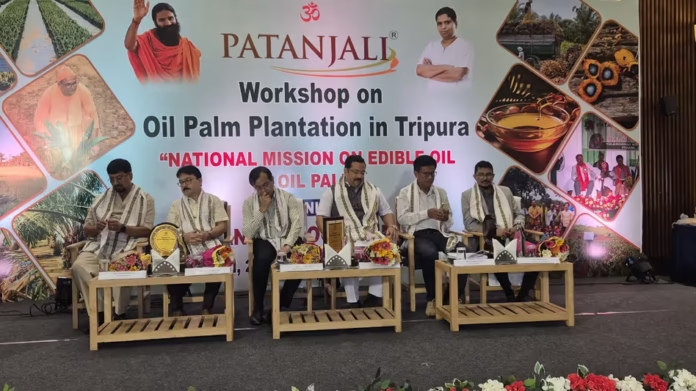Patanjali Foods has announced a large-scale oil palm cultivation project in Tripura, covering 10,000 hectares over the next two years. The company aims to boost India’s self-reliance in edible oil production while strengthening the agricultural economy of the northeastern state. This initiative aligns with the National Mission on Edible Oils – Oil Palm (NMEO-OP), which promotes domestic oil palm farming to reduce dependence on imports.
Patanjali’s investment in Tripura includes setting up a state-of-the-art oil extraction mill and a dedicated training center for farmers. Experts will provide technical guidance on sustainable farming methods, optimal plantation techniques, and oil extraction processes. The company has partnered with the state government to ensure efficient land allocation and smooth implementation of the project. Farmers are being encouraged to shift to oil palm cultivation with the promise of assured buyback agreements, better financial returns, and long-term economic stability.
Acharya Balkrishna, CEO of Patanjali Foods, highlighted that Tripura’s climate and soil conditions are ideal for oil palm cultivation. He emphasized the need for large-scale plantation projects to reduce India’s heavy dependence on imported edible oils. He added that supporting local farmers with proper training, infrastructure, and financial assistance will transform Tripura into a major contributor to India’s edible oil production.
Tripura’s Agriculture Minister welcomed Patanjali’s initiative, calling it a game-changer for the state’s rural economy. He assured full support in facilitating land availability, irrigation facilities, and logistical aid. The government is also working on streamlining the approval process to accelerate plantation efforts. The initiative is expected to generate employment, benefiting both farmers and workers in associated industries like milling, packaging, and transportation.
Local farmers have expressed optimism about the initiative, though some have raised concerns about environmental impact and long-term soil fertility. Experts have stressed the importance of sustainable cultivation practices, including intercropping and soil conservation measures, to prevent land degradation. Environmental groups have urged for a careful approach to ensure biodiversity preservation while expanding oil palm cultivation.
Patanjali’s oil extraction mill will be a key component of the initiative, providing local processing facilities to prevent dependency on external mills. This will reduce costs and enhance profit margins for farmers. The training center will focus on educating farmers about disease management, irrigation techniques, and yield optimization. Agricultural scientists and experts will conduct regular workshops to ensure farmers are equipped with the latest knowledge.
The central government has backed this expansion, stating that boosting domestic oil palm production is crucial for India’s food security. The NMEO-OP scheme provides subsidies and financial assistance to farmers adopting oil palm cultivation. Officials believe this initiative will significantly contribute to India’s goal of reducing edible oil imports, which currently account for a substantial portion of the country’s expenditure on food imports.
As the project progresses, Patanjali plans to expand its operations beyond Tripura, targeting other northeastern states with suitable climatic conditions for oil palm farming. The company is also exploring sustainable processing techniques to minimize environmental impact. With large-scale investments, technological support, and government backing, Tripura is poised to become a major hub for oil palm cultivation in India.
Despite the excitement surrounding the project, experts have cautioned against excessive reliance on monoculture plantations. Sustainable farming practices, water resource management, and responsible land-use policies will be critical to the long-term success of this initiative. The state government has assured that environmental regulations will be strictly enforced to balance economic growth with ecological preservation.
Patanjali’s initiative has also sparked discussions on the impact of large-scale oil palm plantations on traditional farming practices. Many farmers in Tripura rely on rubber, tea, and areca nut cultivation, and some are hesitant to switch to oil palm without a clear understanding of its long-term profitability. To address these concerns, Patanjali and state agricultural officials have launched awareness campaigns highlighting the financial benefits and government support available under the NMEO-OP scheme.
The introduction of oil palm cultivation in Tripura is expected to improve infrastructure in rural areas. With increased investments in road connectivity and irrigation facilities, local farmers will gain better access to markets and resources. The state government is working closely with financial institutions to ensure farmers have easy access to credit, helping them invest in necessary equipment and fertilizers for better yield.
The employment potential of this project extends beyond farming. With the establishment of an oil extraction mill, jobs will be created in processing, transportation, and logistics. Additionally, training programs at the newly proposed center will equip workers with skills in modern agricultural techniques, increasing their employability in related industries. Women in rural communities are also expected to benefit from the project, with opportunities emerging in plantation work, packaging, and quality control.
Environmentalists have called for a thorough assessment of the ecological consequences of large-scale oil palm plantations. Some experts fear that excessive water usage and deforestation could lead to soil degradation and reduced biodiversity. In response, Patanjali has assured that sustainable farming methods will be followed, including water conservation techniques and mixed cropping to maintain soil fertility.
The success of this initiative in Tripura could pave the way for similar projects across the Northeast. The region’s climate is favorable for oil palm cultivation, and with government backing, more agribusiness companies might invest in the sector. If implemented effectively, this project could transform Tripura into a key player in India’s edible oil market while improving the livelihoods of thousands of farmers.

